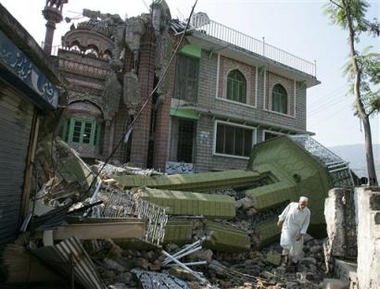|
South Asia quake victims wait for relief
(AP)
Updated: 2005-10-10 19:25
Shopkeepers clashed with looters Monday, and hungry
families huddled under tents while waiting for relief supplies after Pakistan's
worst earthquake razed entire villages and buried roads in rubble. Death toll
estimates ranged from 20,000 to 30,000.

A Kashmiri man makes his way Monday, Oct. 10,
2005 through a fallen minaret of a mosque collapsed by Saturday's severe
earthquake in Muzaffarabad, capital of Pakistani Kashmir. More than 18,000
people were reportedly killed by the earthquake that struck Pakistan,
India and Afghanistan. [AP] |
The United Nations said more than 2.5 million people were left homeless by
Saturday's monster 7.6-magnitude quake, and doctors warned of an outbreak of
disease unless more relief arrives soon.
With landslides blocking roads to many of the worst-hit areas, Pakistan's
army was flying food, water and medicine into the disaster zone. International
relief efforts cranked into action, and an American plane full of relief
supplies landed at an air base near Pakistan's capital on Monday.
Most of the dead were in Pakistan's mountainous north. India reported more
than 800 deaths; Afghanistan reported four.
In the shattered streets of Muzaffarabad, where at least 11,000 people died,
an Associated Press reporter saw shopkeepers scuffle with people trying to break
into businesses. They beat each other with sticks and threw stones, and some
people suffered head wounds. No police were nearby.
Residents of Muzaffarabad, the capital of Pakistan's portion of divided
Kashmir, said looters also targeted deserted homes. Survivors lacked food and
water, and there was little sign of any official coordination of relief in the
devastated city of 600,000.
About 2,000 people huddled around campfires through the cold night on a
soccer field on the city's university campus, where most buildings had collapsed
and hundreds were feared buried in classrooms and dormitories. Soldiers burrowed
into the concrete with shovels and iron bars.
"I don't think anybody is alive in this pile of rubble," rescue worker Uzair
Khan said. "But we have not lost hope."
On the soccer field, Mohammed Ullah Khan, 50, said a few biscuits handed out
by relief workers was all he had to eat for three days. His wife, who suffered a
fractured leg, was wrapped in a yellow quilt beside him.
Their three-story home had collapsed in the quake. His family of 10 survived
because they were on the top floor, which crashed to the ground. "My children
are now on a hillside, under the open sky, with nothing to eat," he said.
A doctor, Iqbal Khan, said there was a serious risk of diseases such as
diarrhea and pneumonia if drinking water and other relief supplies do not arrive
quickly. "These people feel as if there is no one to take care of them," he
said.
The city had no electricity, and people collected water from a mountain
stream. Shops and the city's military hospital had collapsed.
Pakistani President Gen. Pervez Musharraf said the earthquake was the
country's worst on record and appealed for urgent help, particularly cargo
helicopters to reach remote areas.
President Bush on Sunday promised cash and said he had told Musharraf "we
want to help in any way we can."
U.S. forces in Afghanistan prepared to send five Chinook transport
helicopters and three Blackhawk helicopters to Pakistan on Monday to help ferry
relief supplies.
"Pakistan is one of our closest allies in the war on terror and we want to
help them in this time of crisis," said Sgt. Marina Evans, a U.S. military
spokeswoman in Kabul. "The terrorists make us out as the infidels, but this is
not true, and we hope this mission will show that."
India, a longtime rival of Pakistan, offered help in a gesture of
cooperation. The nuclear-armed neighbors have been pursuing peace after fighting
three wars since independence from British rule in 1947, two of them over the
Kashmir region.
Other international aid, including emergency rescue workers, began to flow
in. Planes arrived from Turkey, Britain, Japan and the United Arab Emirates.
Russia, China and Germany also offered assistance.
Pakistani Prime Minister Shaukat Aziz said his country's death toll was
19,396 and was expected to rise.
Senior officials in Pakistan's portion of Kashmir put the death toll much
higher. The top elected official in the region, Sardar Sikandar Hayat, said that
more than 25,000 people had died there with "countless" injured. Tariq Mahmood,
the province's communications minister, put the toll at over 30,000.
Troops "have not started relief work in remote villages where people are
still buried in the rubble, and in some areas nobody is present to organize
funerals for the dead," Mahmood said.
The quake was felt across a wide swath of South Asia, with damage spanning at
least 250 miles, from Jalalabad in Afghanistan to Srinagar in northern Indian
territory.
In Geneva, the United Nations urgently appealed for donations, including for
at least 200,000 winterized tents.
On the Indian side of the militarized Kashmir border — where at least 800
have died — hundreds of Kashmiris spent Sunday night outside in the cold after
rumors of another temblor. Hundreds of mosques announced warnings of a further
quake over loudspeakers; none was reported.
|